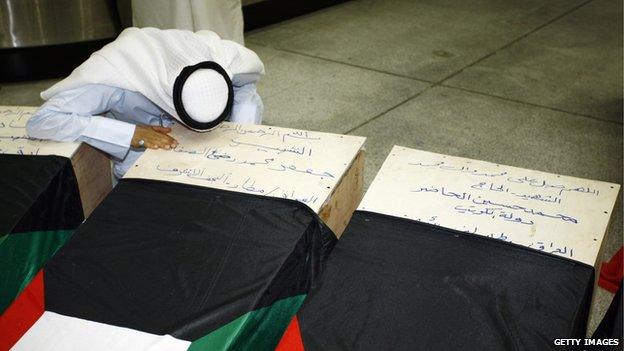How one country came together after a terror attack
- Published

A Kuwaiti man mourns over the coffin of a relative, who lost his life during the attack on a mosque in Kuwait City that killed at least 27 people on Friday.
Following a suicide attack on a mosque, many Kuwaitis have reacted by publicly rejecting sectarianism and calling for unity on their social media accounts.
The bomber, who authorities say was from Saudi Arabia, targeted a Shia mosque, in a country where a majority are followers of Sunni Islam. The attack left at least 27 dead and more than 200 injured.
It was designed to rip the country apart. But online, as well as on the streets of Kuwait City, the attack had the opposite effect. Tens of thousands took to social media to express national unity. An Arabic hashtag which translates as "one rank" has been used more than 10,000 times since the attack - the idea behind the tag was that Kuwaitis should unify, like an army, to defeat terrorism.
A common sentiment was expressed by @hamedalbader, external: "Terrorism doesn't have a religion or a nationality. So let's not attribute criminal activities such as this to a certain segment of society and take our anger out on them."
Similar hashtags such as "Kuwait is one" and "Kuwait is strong" also trended. Several repeated the words of the country's Emir, Sabah IV Ahmad Al-Jaber Al-Sabah, who visited the mosque shortly after the attack and reportedly said of those who died: "they are my children."
Also being shared was video, external of a prominent Shia journalist and presenter, Abdullah Boftain, external, who spoke outside the mosque soon after the attack, urging people not to point the finger of blame at Sunnis. Boftain said that the blame should only be placed with Islamic State, who claimed responsibility for the attack.
"The country needs us to be united", he said, adding: "what is being attacked today is Islam… not the Shias or the Sunnis."
A passionate speech against sectarianism by journalist Abdullah Boftain was captured on video outside the mosque
Shias make up around 30-40% of the population of Kuwait. Over the weekend, videos of people from both branches of Islam praying alongside one another were shared widely, as well as images of hundreds of Kuwaitis - both Sunni and Shia - queuing up to donate blood for the victims of the attack.
Journalist Ghannam Al-Ghannam lost his close friend Ali Rabi Al-Nasser in the attack. He told Trending that the fact that he was a Sunni and his friend was a Shia was never something that crossed their minds. But he said that following Islamic State's attack on a Shia mosque in Saudi Arabia earlier this year, he was worried and told his friend: "I think you should start praying at home." Ghannam remembers that Ali replied: "Don't worry, we'll install cameras in the mosque, it will be fine."
Blog by Sumaya Bakhsh
Next story: Who came out against Facebook's rainbow flags?
It was wildly popular, but not everybody likes Facebook's pro-gay marriage photo filter - it's prompted a backlash in Russia and across the Arab world. READ MORE
You can follow BBC Trending on Twitter @BBCtrending, external, and find us on Facebook, external. All our stories are at bbc.com/trending.
